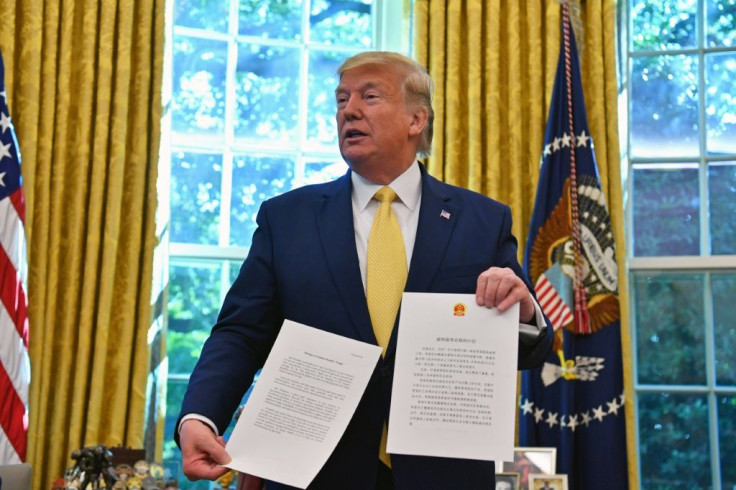US-China Trade Deal: Xi Wants Another Round Of Talks Before Signing Deal

China replied to president Donald Trump's claims about reaching a “very substantial phase one deal" by denying such a deal was reached and demanding another round of talks. It also demands the Trump administration scrap its tariff hike scheduled for Dec. 15 as part of any phase one deal.
Chinese state-controlled media on Monday refused to call phase one a “deal” but did admit “substantial progress” was made in the Washington D.C. talks last week. None of these media outlets made any mention at all about China's consenting to buy up to $50 billion of U.S. agricultural products.
Trump on Sunday asserted China had already begun making purchases of U.S. agricultural products even before terms of the deal were even discussed. Trump gave no proof to support his assertion China had actually signed contracts to buy U.S. agricultural products.
Trump compounded his claim by doubling down, and in a tweet said, "My deal with China is that they will IMMEDIATELY start buying very large quantities of our Agricultural Product, not wait until the deal is signed over the next 3 or 4 weeks."
China now demands another round of trade talks within this month before signing phase one, according to CNBC’s Kayla Tausche on Monday. Trump earlier said a written deal might take up to five weeks to negotiate, which brings this time frame to late November.
Tausche said another round of face-to-face negotiations is “likely” given the huge number of unresolved issues left on the bargaining table. Other media reports say the new round might take place in Washington and that vice premier Liu He will again lead the Chinese delegation.
China's repudiation stands in stark contrast to Trump's rosy picture of the trade talks and its allegedly huge success.
On Oct. 11, Trump boasted about phase one of what he claims is a larger trade deal in with China. As part of phase one, he said the U.S. won't impose the tariff increase planned for today (Tuesday). The U.S. was set to raise tariffs on about $250 billion worth of goods on October 15 to 30% from 25%.
Trump claims China will purchase between $40 billion and $50 billion in U.S. agricultural products. He admitted there isn't a formal, written deal and the specifics of the verbal "deal" will have to be hammered out. No formal deal has been signed.
Trump said he hopes a formal deal will be had in November. The vagueness of the "deal" has ignited skepticism among financial experts worldwide.
Morgan Stanley said that without a durable trade dispute settlement mechanism in place, another round of tariff increases is likely.
“There is not yet a viable path to existing tariffs declining, and tariff escalation remains a meaningful risk,” said Morgan Stanley in a note to its clients.
“Thus, we do not yet expect a meaningful rebound in corporate behavior that would drive global growth expectations higher.”
© Copyright IBTimes 2025. All rights reserved.





















